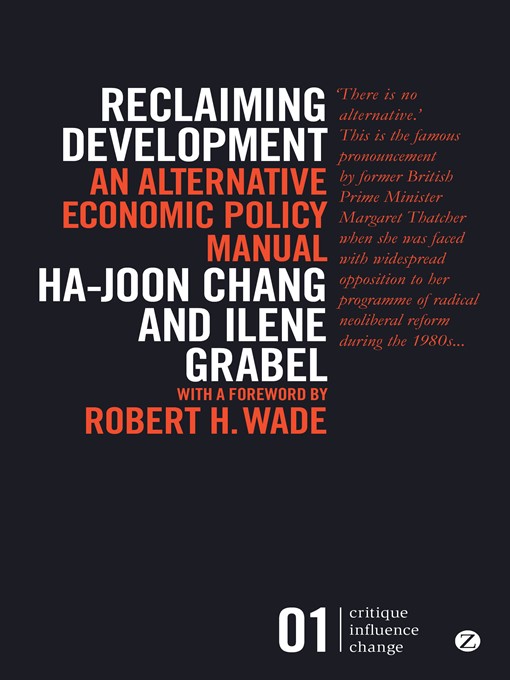 There is no alternative to neoliberal economics – or so it appeared when Reclaiming Development was first published in 2004. Many of the same driving assumptions – monetarism and globalization – remain within the international development policy establishment. Ha-Joon Chang and Ilene Grabel confront this neoliberal development model head-on by combining devastating economic critique with an array of innovative policies and an in-depth analysis of the experiences of leading Western and East Asian economies. Reclaiming Development will appeal to students interested in development policy as well as professional economists, writes Chandni Singh.
There is no alternative to neoliberal economics – or so it appeared when Reclaiming Development was first published in 2004. Many of the same driving assumptions – monetarism and globalization – remain within the international development policy establishment. Ha-Joon Chang and Ilene Grabel confront this neoliberal development model head-on by combining devastating economic critique with an array of innovative policies and an in-depth analysis of the experiences of leading Western and East Asian economies. Reclaiming Development will appeal to students interested in development policy as well as professional economists, writes Chandni Singh.
 Reclaiming Development: An Alternative Economic Policy Manual. Ha-Joon Chang and Ilene Grabel. Zed Books. January 2014.
Reclaiming Development: An Alternative Economic Policy Manual. Ha-Joon Chang and Ilene Grabel. Zed Books. January 2014.
Reclaiming Development is not an easy book to read. Yet, readers would find it impossible to take lightly. As relevant in 2014 as when it was first published in 2004, it challenges and discredits commonly held economic universal truths and questions the ‘triumphalism, hubris and closed-mindedness of the neoliberal orthodoxy’ (p. 1). In doing so, it compels the reader to join the authors in questioning the continued discursive hegemony of neoliberalism at the cost of all other policy alternatives, and provides a radical strategy for alternative economic policy.
Ha-Joon Chang is a renowned heterodox economist, professor at Cambridge University, and author of 23 Things They Don’t Tell You About Capitalism. His co-author, Ilene Grabel is also an economist and professor at the Josef Korbel School of International Studies at the University of Denver. The 2014 edition of the book, launched under the Critique Influence Change Series, shares space with other books that challenge the status quo in their disciplines.
Reclaiming Development questions the premise of commonly held economic ideas and presents statistics and case studies to construct an alternative narrative. It critiques the conception of economics as the social equivalent of physics (i.e. the belief that economic behaviour and policies can be reduced to mathematical formulae in an objectivist manner). In the forward, Robert H. Wade, Professor of Political Economy at LSE, identifies three reasons for the continued dominance of the neoliberal paradigm. First is the self-perpetuating hegemony of journals such as Econometrica and American Economic Review that espouse a distinctly neoliberal agenda. Second, research affirming the efficient market hypothesis secures funding more easily than studies such as those by heterodox economist Steve Keen, whose proposals to model debt deflation have been turned down nine times since 1996! This funding pattern sustains the dominance of the neoliberal viewpoint. Third, large organisations follow a ‘logic of action’ (consideration of two alternatives where one alternative is so absurd that it is as good as ‘there is no alternative’ – TINA), rather than ‘logic of decision-making’ (consideration of several policies alternatives neutrally).
The book is divided into two parts. Part I presents six ‘development myths’. Each myth is first stated, then explored (with the authors providing a compelling case for the myth), and finally debunked through a detailed cross-examination. Part II is a ‘manual of economic policy’ (p. 53) and consists of five chapters covering five policy alternatives. Each chapter begins with an explanation of the neoliberal view, followed by counterarguments that challenge this view, and a range of innovative and economically feasible policy alternatives.
In Chapter 2, the development myth that ‘Neoliberalism Works’ is examined. Chang and Grabel show that neoliberal policy, which elevates markets over governments, espouses free trade and market-determined exchange rates, and enhances the scope of the private sector, has not delivered economic development. Contrarily, it has introduced additional ‘adjustment costs’ as countries transition towards a neoliberal framework, and deepened income inequality within and among countries by concentrating capital inflows, liberalising domestic labour and financial markets and institutionalising tax reforms. Giving the example of Taiwan, South Korea and China, the authors demonstrate that private capital flows, follow rather than create rapid growth. Thus poorer countries, which need capital the most, attract less Foreign Direct Investment (FDI). It is telling that of all north to south FDI, China received 37% while the entire, arguably poorer, sub-Saharan Africa received 4.9%!
After a systematic critique of the ‘myths’ perpetuated by neoliberal economics (such as ‘the American model of capitalism represents an ideal all developing countries should aspire to’ and ‘wealthy countries achieved success through commitment to the free market’), the authors discuss economically feasible alternative policies in Part II of the book.

In Chapter 8, the promotion of privatisation as a panacea is examined. Chang and Grabel challenge the view that structural characteristics of State Owned Enterprises (SOEs) (managers who are not owners but ‘hired hands’, low incentives to provide cheap services or low prices, and monopolistic functioning) make them prone to inefficiency and mismanagement. While presenting the neoliberal view, Chang and Grabel cite studies from Tanzania where subsidies to SOEs account for 72% and 150% of government expenditure on education and health respectively! However, they counter such statistics by showing that these are anecdotal and do not capture the range of SOE performance in different countries. For example, Taiwan has one of the largest SOE sectors in the world and was the fastest growing economy in the post-World War II period. They also argue that while privatisation is appropriate in some contexts, SOEs are better suited in other areas. One such example is that of ‘natural monopolies’ such as electricity where the required scale of investment is so large that economic sense dictates that one firm should operate.
In Chapter 9, the authors criticise the view that unrestricted international private capital flows automatically deliver economic benefits. They note that sudden, large inflows of capital can cause appreciation of domestic currency, leading to an increase in imports (as they become cheaper for domestic consumers) and fall in exports (because they become more expensive for non-domestic consumers). On the flipside, large financial outflows or ‘capital flight’ may lead to sudden currency depreciation, additional capital flight, and reduction in stocks and other assets. As an alternative, the authors suggest that well-designed capital controls can manage capital volume, composition, and allocation. If designed to assess specific vulnerabilities in the target economies, such controls can promote financial stability, prevent economic crisis, and attract desirable investment. They can also enhance national autonomy by reducing potential for external actors to influence domestic policymaking. These measures have been successfully used in continental Europe post World War II and by Brazil (1950s, 1960s), Chile and Colombia (1990s), and Malaysia (1994, 1998). Japan, South Korea, and Taiwan successfully aligned foreign capital flow policies with their national development strategy through restrictive FDI policies, which included mandatory ‘local content’, carefully chosen sectors open to FDI, and limited royalties on technological licenses. In conclusion, the authors warn against treating FDI as the ‘Mother Teresa of capital flows’ (p. 144) and caution developing countries against joining the ‘race to the bottom’ (p.141) that undermines local living standards, disrupts socio-economic development, and traps economies into a downward spiral of debt and dependency.
The key message of the book is clear: alternative policies that do not adhere to the neoliberal worldview do exist and can help promote rapid, equitable, and stable economic development. These proposed strategies are more achievable today than in 2004 because of the current climate of political willingness, increasing acceptance of economic multipolarity, and distrust of the pre-crisis IMF-World Bank led hegemony. Finally, in bold words, the book calls for economists to self-introspect and welcome intellectual pluralism into the discipline.
Reclaiming Development will appeal to students interested in development policy as well as professional economists. While the former will benefit from the accessible writing (the authors helpfully pause to demystify technical jargon), the latter will welcome the grounded arguments presented. Keeping with its mandate of being an ‘alternative economic policy manual’, the book uses a crisp and engaging format relevant to policymakers and development practitioners. Finally, it will also appeal to laypersons keen to make sense of the construction and perpetuation of the myth that neoliberalism is the only alternative.
For those in London, Ha-Joon Chang, Ellie Mae O’Hagan, and Duncan Green are launching the book at a free event organised by Zed Books on 19th March, 2014.
——————————————-
Chandni Singh is a PhD researcher and Felix Scholar at the University of Reading, where her research explores farmer vulnerability to water scarcity and climate change in Rajasthan, India. She holds a masters in Natural Resources Management from The Energy and Resources Institute (TERI) and has worked with indigenous communities in the Himalayas towards climate change adaptation and watershed development. Chandni blogs at Village Vignettes and tweets @chandnisingh233. Read more reviews by Chandni.







